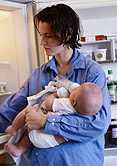
TUESDAY, March 5 (HealthDay News) — New mothers have a much higher rate of obsessive-compulsive symptoms than other people and these symptoms center on their baby’s well-being, a new study indicates.
For example, a new mother may constantly worry and check to see if her baby is still breathing; she may obsess about germs and whether she’s properly sterilized the baby’s bottles and then wash or rewash them; or she may be unduly concerned about injuring her baby, according to the study authors.
The researchers surveyed hundreds of new mothers and found that 11 percent of them had significant obsessive-compulsive symptoms at two weeks and at six months after giving birth. The rate in the general population is 2 percent to 3 percent.
These symptoms are usually temporary and could result from hormonal changes or may be an adaptive response to caring for a new baby, the researchers suggested. They found that about 50 percent of the women reported an improvement in their symptoms by six months. However, some women who did not have symptoms at two weeks developed them at six months.
“It may be that certain kinds of obsessions and compulsions are adaptive and appropriate for a new parent, for example those about cleanliness and hygiene,” study senior author Dr. Dana Gossett, chief and assistant professor of obstetrics and gynecology at Northwestern University Feinberg School of Medicine and a physician at Northwestern Memorial Hospital, said in a Northwestern Medicine news release.
But if these symptoms interfere with normal day-to-day functioning and appropriate care for the baby and parent, they may indicate a mental health problem, the investigators pointed out.
About 70 percent of the women who had obsessive-compulsive symptoms also had depression symptoms. This suggests that obsessive-compulsive disorder in new mothers represents a distinct mental illness, said study lead author Dr. Emily Miller, a clinical fellow in maternal-fetal medicine at Feinberg.
“There is some debate as to whether postpartum depression is simply a major depressive episode that happens after birth or its own disease with its own features,” Miller said in the news release. “Our study supports the idea that it may be its own disease with more of the anxiety and obsessive-compulsive symptoms than would be typical for a major depressive episode.”
The study appears in the March/April issue of the Journal of Reproductive Medicine.
More information
The Nemours Foundation offers a guide for first-time parents.

